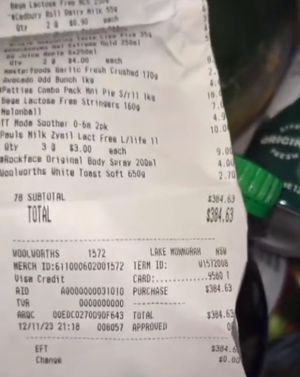Shocking Price of a Woolworths Grocery Haul Reveals Living Cost Crisis
By
- Replies 36
As Australians continue to struggle with the skyrocketing cost of living, one shopper recently revealed the shockingly high price he paid for a small grocery haul from Woolworths. The video, shared on social media, showed the man's haul of basic items like meat, fruit, vegetables and drinks totaling a staggering $384.63.
This seemingly outrageous total reflects the brutal reality of grocery prices in Australia right now. Compared to a year ago, food prices have risen by 7.5% – the highest increase since the early 2000s. Experts attribute this rapid inflation to a mix of global factors like supply chain disruptions, the war in Ukraine, and rising oil prices. For the average family already strained by higher mortgage repayments and utility bills, these price hikes have suddenly pushed groceries out of reach.
The shopper's video provides a sobering look at how a typical grocery run can now burn a hole in your wallet. The relatively small haul could barely fill one bag, yet the bill approached $400. Scrutinising the receipt reveals some particularly painful prices. A single baby formula rang up at $30. Even basic bacon cost $14 while a couple packs of sausages were $16. Fresh produce was no exception, with capsicums coming in at $6 each. For pensioners living on fixed incomes or single adults, bills like this bring true financial pain.
'I've started skipping meals to save money,' said Meredith Jones, age 65. 'My pension doesn't stretch as far anymore with food prices so out of control. I've lost weight because I often eat just one meal a day now.'
Other shoppers expressed outrage at the rising cost of staple items. '20 years ago, $50 of groceries could fill your whole cart. Now a child could carry what you get for $50,' lamented another commenter.
So how can the average shopper combat these crazy prices? Experts recommend shopping sales religiously, buying generic brands, and meal prepping to reduce waste. 'Make a detailed list and stick to it strictly. Don’t shop while hungry,' advised personal finance guru Suze Orman.
Planning and smart shopping are more crucial now than ever. In times like these, every cent matters, and knowledge of budgeting tips and strategies can help soften the blow of the groceries bill.
The first rule of thumb would be to plan your meals well in advance. Careful meal planning not only helps in curbing wasteful expenditure, but also in eliminating the need for frequent shopping trips and unsafe impulse buys. Using an old-fashioned notebook to list down meals for the week can make it easier to decide what to buy, and what to give a miss.
Be a student of prices, and an opportunist shopper. Keep an eye on products that are on sale and take advantage of these deals, especially on non-perishable items. Additionally, be open to substituting expensive brands or products with lower-cost and equally nutritious alternatives. A switch from expensive cuts of meat to cheaper cuts or plant proteins, or from brand name goods to store-brand can still ensure a healthy diet without straining the budget.
Consider buying items in bulk, but only those that you can use in large amounts within their expiry dates. Buying in bulk can significantly cut down on the cost per unit of the product. However, don't fall for the trap of buying more than you need just because it's cheaper.
Finally, avoid waste. Australians reportedly waste about 7.6 million tonnes of food every year. Adopting a 'zero waste' approach in your kitchen is not only environmentally friendly but also light on the pocket. This could mean using leftovers creatively, storing food properly, or simply not shopping for more than you need at a time.
In this era of rising grocery prices, it's essential to be smart about how and where we spend our hard-earned money. Remember, it's not only about sacrificing and cutting down – it's about making informed choices and strategically planning our spending. So, take charge of your grocery shopping!

While these tips can help, the reality is that grocery costs are crippling Aussie budgets. Have you drastically changed your shopping habits lately? What prices have shocked you the most? Share your thoughts and money-saving tactics below!
This seemingly outrageous total reflects the brutal reality of grocery prices in Australia right now. Compared to a year ago, food prices have risen by 7.5% – the highest increase since the early 2000s. Experts attribute this rapid inflation to a mix of global factors like supply chain disruptions, the war in Ukraine, and rising oil prices. For the average family already strained by higher mortgage repayments and utility bills, these price hikes have suddenly pushed groceries out of reach.
The shopper's video provides a sobering look at how a typical grocery run can now burn a hole in your wallet. The relatively small haul could barely fill one bag, yet the bill approached $400. Scrutinising the receipt reveals some particularly painful prices. A single baby formula rang up at $30. Even basic bacon cost $14 while a couple packs of sausages were $16. Fresh produce was no exception, with capsicums coming in at $6 each. For pensioners living on fixed incomes or single adults, bills like this bring true financial pain.
'I've started skipping meals to save money,' said Meredith Jones, age 65. 'My pension doesn't stretch as far anymore with food prices so out of control. I've lost weight because I often eat just one meal a day now.'
Other shoppers expressed outrage at the rising cost of staple items. '20 years ago, $50 of groceries could fill your whole cart. Now a child could carry what you get for $50,' lamented another commenter.
So how can the average shopper combat these crazy prices? Experts recommend shopping sales religiously, buying generic brands, and meal prepping to reduce waste. 'Make a detailed list and stick to it strictly. Don’t shop while hungry,' advised personal finance guru Suze Orman.
Planning and smart shopping are more crucial now than ever. In times like these, every cent matters, and knowledge of budgeting tips and strategies can help soften the blow of the groceries bill.
The first rule of thumb would be to plan your meals well in advance. Careful meal planning not only helps in curbing wasteful expenditure, but also in eliminating the need for frequent shopping trips and unsafe impulse buys. Using an old-fashioned notebook to list down meals for the week can make it easier to decide what to buy, and what to give a miss.
Be a student of prices, and an opportunist shopper. Keep an eye on products that are on sale and take advantage of these deals, especially on non-perishable items. Additionally, be open to substituting expensive brands or products with lower-cost and equally nutritious alternatives. A switch from expensive cuts of meat to cheaper cuts or plant proteins, or from brand name goods to store-brand can still ensure a healthy diet without straining the budget.
Consider buying items in bulk, but only those that you can use in large amounts within their expiry dates. Buying in bulk can significantly cut down on the cost per unit of the product. However, don't fall for the trap of buying more than you need just because it's cheaper.
Finally, avoid waste. Australians reportedly waste about 7.6 million tonnes of food every year. Adopting a 'zero waste' approach in your kitchen is not only environmentally friendly but also light on the pocket. This could mean using leftovers creatively, storing food properly, or simply not shopping for more than you need at a time.
In this era of rising grocery prices, it's essential to be smart about how and where we spend our hard-earned money. Remember, it's not only about sacrificing and cutting down – it's about making informed choices and strategically planning our spending. So, take charge of your grocery shopping!
Key Takeaways
- An Australian man has revealed on social media that he paid almost $400 for a small amount of groceries from Woolworths.
- The video showing his small grocery haul has caused shock and calls for the Reserve Bank of Australia to address skyrocketing inflation rates.
- A Canstar Blue report found the average Australian household spends $176 per week on groceries, with many Australians tightening their budgets due to increased utility bills.
- This comes after another recent incident where a Melbourne cafe was criticised for charging $14 for a ham and cheese croissant.
While these tips can help, the reality is that grocery costs are crippling Aussie budgets. Have you drastically changed your shopping habits lately? What prices have shocked you the most? Share your thoughts and money-saving tactics below!








